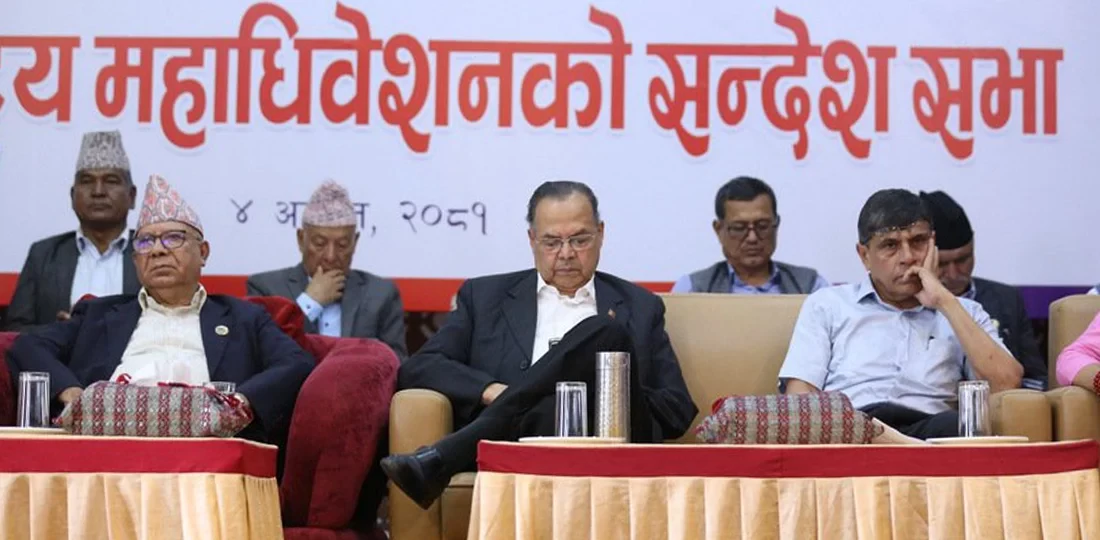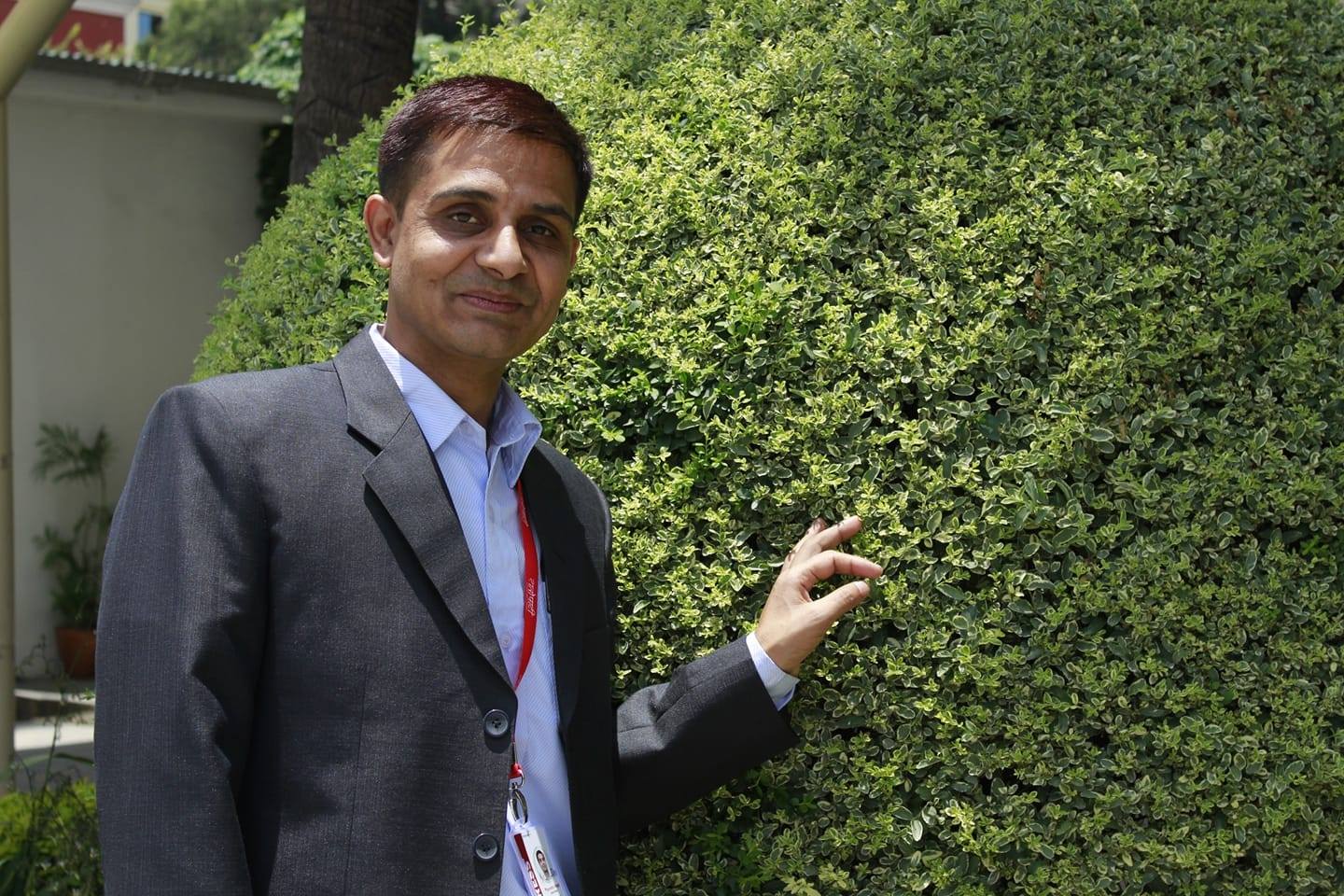CPN (Unified Socialist) leaders face backlash over broken promises

Kathmandu, October 8 — The leaders of the CPN (Unified Socialist), including Chairman Madhav Kumar Nepal, respected leader Jhalanath Khanal, and General Secretary Ghanshyam Bhusal, have caused significant disappointment and division within the party by violating their commitments.
The activities conducted in the aftermath of the convention regarding the election of office bearers and the Politburo have drawn lines of extreme disappointment and division within the party, violating the promises made during the general convention held in July.
They have warned Chairman Madhav Kumar Nepal that if mistakes are not corrected immediately, party unity will not be sustainable.
Over a hundred leaders, including Dr. Bijay Poudel, Jeevan Ram Shrestha, Hari Parajuli, Dev Singh Mahat, and Sagar Nepal, submitted a memorandum to Chairman Madhav Nepal, Vice Chairpersons Pramesh Hamal, Ghanendra Basnet, and General Secretary Ghanshyam Bhusal on Monday, demanding an immediate central committee meeting to address the issues and to dissolve the office bearers and Politburo committee.
They have expressed concern that instead of a broad enthusiasm and unity within the party after the tenth general convention, serious scenarios of disappointment and division are emerging.
The primary reason for this, they claim, is the violation of the promises made by the three elected leaders, Madhav Kumar Nepal, respected leader Jhalnath Khanal, and General Secretary Ghanshyam Bhusal, in front of all representatives at the convention.
They have also pointed out that the current leadership has not been able to ideologically unify the organizational work conducted after the party division and has failed to consider the structural unity.
They noted, “It appears that there is an intention to create a favorable leadership similar to the old party that has been around for a long time. The province in-charges and chairmen were given quotas less than the number of districts in their geography, while the inclusive quota was kept under the discretion of the leadership.”
According to them, due to the leadership's favoritism, the central committee has become more favorable to individuals rather than the party, preventing active leaders and workers who are continuously active in the geography from coming to the forefront.
Questions over 344 central committee members
During the convention held in July, 93 central committee members, including Chair Nepal, respected leader Khanal, and General Secretary Bhusal, were unanimously approved from the convention hall. The remaining 206 central members were proposed with the consent of Nepal, Khanal, and Bhusal. Although the representatives at the convention had the inherent right to support or reject the proposed members, the leaders have disregarded this.
Moreover, contrary to the mandate of the convention hall to form a 299-member central committee, a committee of 344 members was formed to fulfill the leaders’ interests. This, they argue, has resulted in long-serving and deserving members being sidelined in favor of those close to the top leaders.
The convention hall had mandated that the central committee's decisions should be finalized by the end of July. However, the announcement of the central committee on August 30 has also faced objections from the leaders.
“Who gave this mandate? If 93 had this mandate, how can the nominated committee elect office bearers? Such actions have created widespread disappointment and dissatisfaction within the party. It seems that the main factor behind this is the leadership's violation of the watchman bond made at the convention stage,” the letter submitted to the top leaders states.
It is worth noting that Chairman Madhav Nepal had expressed a commitment to elect the remaining leadership by consensus, along with the initial 93-member central committee, before the representatives present at the convention.
Before selecting the office bearers in the long-formed nominated central committee, Chair Nepal also sought the opinions of the main leaders from all provinces regarding the selection of office bearers and the Politburo.
During this consultation, everyone reminded Chair Nepal that the selection of leadership, including office bearers, needed to be done by consensus as per the convention's 'mandate.'
Despite this, the leadership proceeded with the election of office bearers through the nominated committee. As soon as the elections were held, dissatisfaction began to explode when leaders who were not favored by the top leadership faced rejection.
Typically, in a communist party, leadership is constructed based on certain methodologies, evaluations, and plans. However, the leaders assert that there has been a violation of procedures, regulations, and principles within the Unified Socialist Party.
“There has been a serious violation of the procedures throughout the convention. Actions taken contradict the spirit of the constitution passed by the central council meeting and the subsequent central committee meeting,” the leaders stated. This is also the reason why local activists are leaving the party, and some are allegedly trying to divide the party in a planned manner.
In order to prevent any disruption to the internal unity of the party, the leaders, including Chair Nepal, have been urged in the letter to implement immediate two-point suggestions to strengthen internal unity. Dissatisfied leaders like Jeevan Ram Shrestha argue that if the leadership's wrongdoings are not corrected, the party will not be able to function.
“How can the party function if mistakes are not corrected? Any party operates on rules, regulations, and procedures,” Shrestha stated, “Only when the party operates in this way can it build an organization and achieve its objectives based on that organizational strength.”
What are the two-point suggestions?
(1) All actions taken contrary to the mandate of the convention should be annulled.
(2) An immediate central committee meeting should be called to conduct a thorough review of the overall processes from the establishment of our party, the Nepal Communist Party (Unified Socialist), to the tenth convention, as well as the circumstances that have arisen within the party, drawing conclusions to ensure the internal unity of the party and pave the way for its development and expansion.
Comprehensive review: Vice Chairman Basnet
Vice Chairman Ghanendra Basnet acknowledged the rising dissatisfaction within the party and stated that a review would be conducted to identify the reasons for the dissatisfaction. He mentioned that demands to annul the elections of various committees did not seem practical, suggesting that they could move forward by correcting weaknesses in the future.
“Some committees were formed unanimously while others were elected. I don’t think it is possible to annul those committees and return to the convention process. Doing so might raise another wave of dissatisfaction,” Basnet said. According to him, Chairman Nepal has agreed to hold a central committee meeting in the first week of Kartik to review the situation.
With the letter from the leaders, Chairman Madhav Kumar Nepal has called for a meeting of the task force on Tuesday. The seven-member task force will discuss the dissatisfaction of the leaders and the letter, according to Basnet.










Leave Comment